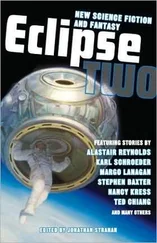Upon returning home, Janice resumed her evangelism, but the topic of her speeches has changed. She no longer speaks about how the physically handicapped have the resources to overcome their limitations; instead she, like the other eyeless, speaks about the unbearable beauty of God’s creation. Many who used to draw inspiration from her are disappointed, feeling they’ve lost a spiritual leader. When Janice had spoken of the strength she had as an afflicted person, her message was rare, but now that she’s eyeless, her message is commonplace. She doesn’t worry about the reduction in her audience, though, because she has complete conviction in what she evangelizes.
Ethan quit his job and became a preacher so that he too could speak about his experiences. His wife Claire couldn’t accept his new mission and ultimately left him, taking their children with her, but Ethan was willing to continue alone. He’s developed a substantial following by telling people what happened to Neil Fisk. He tells people that they can no more expect justice in the afterlife than in the mortal plane, but he doesn’t do this to dissuade them from worshiping God; on the contrary, he encourages them to do so. What he insists on is that they not love God under a misapprehension, that if they wish to love God, they be prepared to do so no matter what His intentions. God is not just, God is not kind, God is not merciful, and understanding that is essential to true devotion.
As for Neil, although he is unaware of any of Ethan’s sermons, he would understand their message perfectly. His lost soul is the embodiment of Ethan’s teachings.
For most of its inhabitants, Hell is not that different from Earth; its principal punishment is the regret of not having loved God enough when alive, and for many that’s easily endured. For Neil, however, Hell bears no resemblance whatsoever to the mortal plane. His eternal body has well-formed legs, but he’s scarcely aware of them; his eyes have been restored, but he can’t bear to open them. Just as seeing Heaven’s light gave him an awareness of God’s presence in all things in the mortal plane, so it has made him aware of God’s absence in all things in Hell. Everything Neil sees, hears, or touches causes him distress, and unlike in the mortal plane this pain is not a form of God’s love, but a consequence of His absence. Neil is experiencing more anguish than was possible when he was alive, but his only response is to love God.
Neil still loves Sarah, and misses her as much as he ever did, and the knowledge that he came so close to rejoining her only makes it worse. He knows his being sent to Hell was not a result of anything he did; he knows there was no reason for it, no higher purpose being served. None of this diminishes his love for God. If there were a possibility that he could be admitted to Heaven and his suffering would end, he would not hope for it; such desires no longer occur to him.
Neil even knows that by being beyond God’s awareness, he is not loved by God in return. This doesn’t affect his feelings either, because unconditional love asks nothing, not even that it be returned.
And though it’s been many years that he has been in Hell, beyond the awareness of God, he loves Him still. That is the nature of true devotion.
LIKING WHAT YOU SEE: A DOCUMENTARY
‘Beauty is the promise of happiness.’
– Stendhal
Tamera Lyons, first-year student at Pembleton:
I can’t believe it. I visited the campus last year, and I didn’t hear a word about this. Now I get here and it turns out people want to make calli a requirement. One of the things I was looking forward to about college was getting rid of this, you know, so I could be like everybody else. If I’d known there was even a chance I’d have to keep it, I probably would’ve picked another college. I feel like I’ve been scammed.
I turn eighteen next week, and I’m getting my calli turned off that day. If they vote to make it a requirement, I don’t know what I’ll do; maybe I’ll transfer, I don’t know. Right now I feel like going up to people and telling them, ‘Vote no.’ There’s probably some campaign I can work for.
Maria deSouza, third-year student, President of the Students for Equality Everywhere (SEE):
Our goal is very simple. Pembleton University has a Code of Ethical Conduct, one that was created by the students themselves, and that all incoming students agree to follow when they enroll. The initiative that we’ve sponsored would add a provision to the code, requiring students to adopt calliagnosia as long as they’re enrolled.
What prompted us to do this now was the release of a spex version of Visage. That’s the software that, when you look at people through your spex, shows you what they’d look like with cosmetic surgery. It became a form of entertainment among a certain crowd, and a lot of college students found it offensive. When people started talking about it as a symptom of a deeper societal problem, we thought the timing was right for us to sponsor this initiative.
The deeper societal problem is lookism. For decades people’ve been willing to talk about racism and sexism, but they’re still reluctant to talk about lookism. Yet this prejudice against unattractive people is incredibly pervasive. People do it without even being taught by anyone, which is bad enough, but instead of combating this tendency, modern society actively reinforces it.
Educating people, raising their awareness about this issue, all of that is essential, but it’s not enough. That’s where technology comes in. Think of calliagnosia as a kind of assisted maturity. It lets you do what you know you should: ignore the surface, so you can look deeper.
We think it’s time to bring calli into the mainstream. So far the calli movement has been a minor presence on college campuses, just another one of the special-interest causes. But Pembleton isn’t like other colleges, and I think the students here are ready for calli. If the initiative succeeds here, we’ll be setting an example for other colleges, and ultimately, society as a whole.
Joseph Weingartner, neurologist:
The condition is what we call an associative agnosia, rather than an apperceptive one. That means it doesn’t interfere with one’s visual perception, only with the ability to recognize what one sees. A calliagnosic perceives faces perfectly well; he or she can tell the difference between a pointed chin and a receding one, a straight nose and a crooked one, clear skin and blemished skin. He or she simply doesn’t experience any aesthetic reaction to those differences.
Calliagnosia is possible because of the existence of certain neural pathways in the brain. All animals have criteria for evaluating the reproductive potential of prospective mates, and they’ve evolved neural ‘circuitry’ to recognize those criteria. Human social interaction is centered around our faces, so our circuitry is most finely attuned to how a person’s reproductive potential is manifested in his or her face. You experience the operation of that circuitry as the feeling that a person is beautiful, or ugly, or somewhere in between. By blocking the neural pathways dedicated to evaluating those features, we can induce calliagnosia.
Given how much fashions change, some people find it hard to imagine that there are absolute markers of a beautiful face. But it turns out that when people of different cultures are asked to rank photos of faces for attractiveness, some very clear patterns emerge across the board. Even very young infants show the same preference for certain faces. This lets us identify certain traits that are common to everyone’s idea of a beautiful face.
Читать дальше











